IOTA Crypto Rating
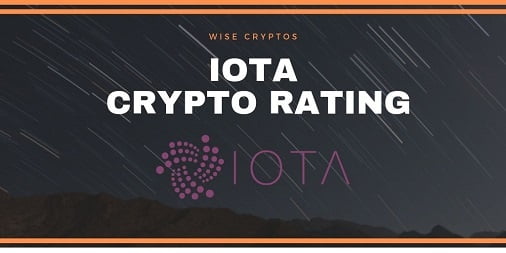
Unlike most cryptocurrency ratings published online, the Wise Crypto ratings have nothing to do with the current or future price of the currency. Whether or not a crypto is over or undervalued or priced today is completely irrelevant. Our research focuses on the sustainability of each project, the security, the use case, decentralisation, environmental impact, the technology, the scalability and the developers and teams behind the projects.
Top Crypto Casinos List:
See all crypto casinos
IOTA Rating = 470/1000
Technology (0 to 300) = 165
- Speed (0 to 50) = 35
IOTA can handle between 500-1000 transactions per second on average. IOTA tangle transactions are confirmed in 30sec-1min, making it among cryptocurrencies with first transaction speeds. But when compared to Ripple and Stellar, 30 secs to confirm a transaction is still relatively slow. There is still a small window for improvement.
- Cost (0 to 50) = 45
The cost of transacting IOTA is free since there is no IOTA mining. Everybody contributes to the network by confirming transactions. This infers that the only cost to be catered for is the small amount of extra electricity consumed. This earns it almost maximum points as it is also branded as an ideal payment system.
- Scalability (0 to 50) = 35
IOTA has solved the block-related scaling problems via its Tangle system. Instead of using blockchain to store transaction info in the blocks (which usually have a limited size), IOTA team developed the Tangle that treats each transaction as unique. This model is quite efficient and solves the scalability problem notorious in most crypto, especially Bitcoin. How far it can really scale though is up for debate and we will need to see cold, hard figures in the up coming years.
- Reliability (0 to 50) = 5
On reliability, IOTA is very reliable thanks to its Tangle model that solves scalability scaling problems experienced in the blockchain. IOTA also allows micro-transactions between individuals, data transfers, decentralized voting, masked messaging, private transactions, and leasing services for the sharing economy. All that makes the network reliable. However the hack (which we will detail later) drastically brings this reliability down and we need to see IOTA have a long period of stability before we can increase that rating.
Update: In December 2019 the network went down and transactions could not be processed for 24 hours. Another serious issue with the reliability of this network.
Update: In February 2020 there was a major hack on the Trinity wallets.
Update: As of February 24th, the IOTA network has been down for 11 days and is not expected to be active again for some time to come.
- Environmental Impact (0 to 50) = 40
IOTA is a non minable green cryptocurrency with minimal environmental impact. Attributed to the scalability of the Tangle, IOTA protocol has relatively low energy consumption. While the CCurl Proof-of-Work and transaction signing operations are somewhat computationally complex, these operations consume much lower energy compared to mineable cryptocurrencies like Bitcoin, which consume immense amounts of energy.
- Decentralization (0 to 50) = 5
IOTA is a fully decentralized network. The platform recently launched the Coordinator mechanism dubbed “Coordicide” aimed to further decentralize its transaction validation. Coordicide manages transaction security, ensuring transactions process and that the same funds are not spent twice (the so-called double spending problem). The launch of Coordicide was an essential step towards complete decentralization of IOTA network. However, Coordicide is not fully implemented in the IOTA system yet. The platform is still using its initial system which is not 100% decentralized. The previous protocol is centralized in a way that if it stopped working properly, then the entire network would be at risk of collapse.
Update: Following the Trinity hack in February 2020, IOTA managed to shut down the entire network very quickly, something that puts question marks on the decentralisation.
Security (-250 to 0) = -140
- Phishing/DDoS Attacks & Hacks (-100 to 0) = -80
IOTA came under public criticism for allegedly allowing scammers to steal around $4 million from many unsuspecting users. In the attack, hackers gained entry into the online private keys generator and collected all the seeds used by IOTA users to gain entry into their online wallets. The attackers then executed a distributed denial of service (DDoS) attack against some of the most popular IOTA full nodes, getting away with $4m in IOTA and preventing the victims from recovering their money. These attacks point at serious security flaws in the IOTA network, which should be improved significantly.
In February 2020 there was a major hack attack on the Trinity wallet.
- Potential For Being Banned (-100 to 0) = -20
IOTA offers a unique solution to scalability issues experienced in the blockchain. Also, IOTA is one of the few cryptos that have more than a dozen of user-cases for its community. It is hard to get rid of it if the network is connected with other projects. As with all other cryptos however we can never take anything for granted when it comes to government regulation.
- Network Vulnerabilities (-50 to 0) = -40
IOTA pose a risk of a replay attack where hackers can repeat a transaction without the sender being aware. Additionally, the network suffers from an immense vulnerability that allows a user to fake signature on transactions and steals or deletes IOTAs from a user’s account. More, IOTA’s cryptographic algorithms may not be strong enough to withstand attacks: a bug-exploit related to key re-use forced all transactions in the centralized coordinator to shut down in October 2017.
Use Case (0 to 500) = 355
- Initial Main Use Case (0 to 100) = 80
IOTA was created with an initial aim of creating a payment system that could process fast, more secure, cheaper and more scalable transaction. So far, the core developers have lived up to their objective. With the number of large companies backing the project it appears IOTA have come up with a winning strategy and use case that real world companies actually want to use.
- Mainnet Live (0 to 200) = 200
IOTA runs an open-source coordinator on Mainnet referred to as Compass. Compass allows anyone to set up a private network, run tests, or develop PoCs much more easily.
- Additional Use Cases (0 to 100) = 35
Besides being a medium of payment, IOTA also offers data recording services. The partnership of IOTA with Ledger and Birdz allows the water management equipment to be able to store data in the IOTA protocol. IOTA blockchain offers security that protects the data uploaded and makes sure it is not be compromised.
Crypto casinos are a valid, legitimate and active use case: there are currently no IOTA casinos or mIota casinos.
- Additional Working Products (0 to 100) = 40
IOTA recently announced that it had built a car charging facility in the Netherlands that will allow people to pay for the electricity they use, automatically. IOTA has also been used in a machine-to-machine economy to streamline processes. For instance, IOTA-enabled vending machine can dispense soda without the associated transaction cost and latency of Bitcoin. IOTA funds can also be used to order products from Amazon.
Core Team, Partnerships & Developers (0 to 200) = 90
- Core Team & Developers (0 to 100) = 10
The development team constitutes of experienced software developers who had a vision of developing software solutions to solve real-life issues. IOTA developers: Sergey Ivancheglo, David Sontesbo, Serguei Popov and Dominik, are top minds in the fintech industry.
In February 2020 a dispute broke out between the co-founders Sergey Ivancheglo and David Sønstebø which brought up many major question marks including alleged stolen funds and alleged illegal employees. The IOTA network seems to be in serious jeapardy and the network has already been completely frozen after a major hack.
- Partnerships (0 to 100) = 80
IOTA has partnered with institutions such as Things Lab, T-Systems, Edag Engineering, Trive.me and DXC. IOTA is also the only crypto that has made a significant mark in the mobility industry. The likes of Volkswagen AG, Daimler Fleetboard (a subsidiary of Mercedes Benz), BMW AG, AUDI AG and Ford Motor Company have all showed interest in IOTA in their ambitions to explore the usability of blockchain technology in the mobility sector.
Relevant news
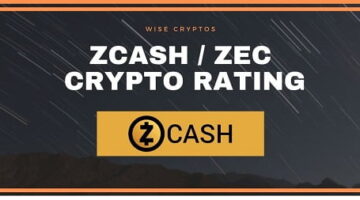
Zcash Crypto Rating
Unlike most cryptocurrency ratings published online, the Wise Crypto ratings have nothing to do with…
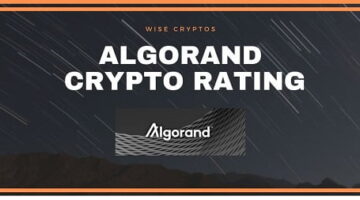
Algorand Crypto Rating
Unlike most cryptocurrency ratings published online, the Wise Crypto ratings have nothing to do with…
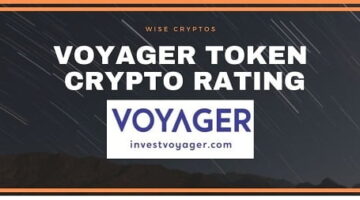
Voyager (VGX, Ethos, BQX) Token Crypto Rating
Unlike most cryptocurrency ratings published online, the Wise Crypto ratings have nothing to do with…
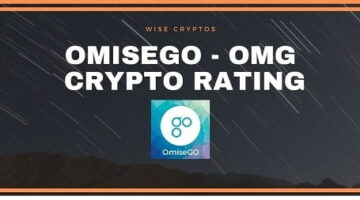
OmiseGo Crypto Rating
Unlike most cryptocurrency ratings published online, the Wise Crypto ratings have nothing to do with…

MaidSafeCoin / SafeCoin Crypto Rating
Unlike most cryptocurrency ratings published online, the Wise Crypto ratings have nothing to do with…
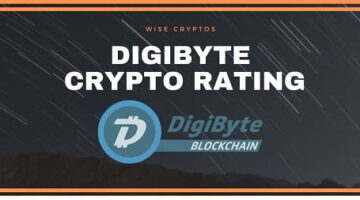
DigiByte Crypto Rating
Unlike most cryptocurrency ratings published online, the Wise Crypto ratings have nothing to do with…
